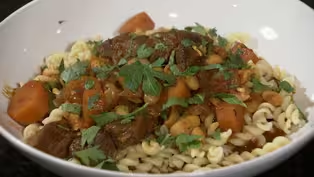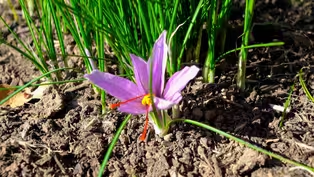
Sustainable Tomato Farm
Clip: 6/30/2023 | 4m 49sVideo has Closed Captions
A tomato farmer adds solar panels to farmland that’s been affected by drought.
A tomato farmer adds solar panels to farmland that’s been affected by drought. Woolf Farming is known as a leader in sustainable agriculture in the Central Valley. It's a point of pride to Stuart Woolf, and, he hopes, a way to ensure the future success of his farm.
Problems playing video? | Closed Captioning Feedback
Problems playing video? | Closed Captioning Feedback
America's Heartland is presented by your local public television station.
Funding for America’s Heartland is provided by US Soy, Sustainable Agriculture Research and Education, Rural Development Partners, and a Specialty Crop Grant from the California Department of Food and Agriculture.

Sustainable Tomato Farm
Clip: 6/30/2023 | 4m 49sVideo has Closed Captions
A tomato farmer adds solar panels to farmland that’s been affected by drought. Woolf Farming is known as a leader in sustainable agriculture in the Central Valley. It's a point of pride to Stuart Woolf, and, he hopes, a way to ensure the future success of his farm.
Problems playing video? | Closed Captioning Feedback
How to Watch America's Heartland
America's Heartland is available to stream on pbs.org and the free PBS App, available on iPhone, Apple TV, Android TV, Android smartphones, Amazon Fire TV, Amazon Fire Tablet, Roku, Samsung Smart TV, and Vizio.
Providing Support for PBS.org
Learn Moreabout PBS online sponsorship♪♪ [Stuart Woolf] The thing I love about farming- and I would tell this to anybody that's even thinking about it.
There's a couple of things.
One, I think there's perpetual demand for the products that we produce.
People are going to eat and the... the world continues to grow.
And it's almost like every year, you start over again.
It's like a new football season or basketball season, where you finish one crop year, you start preparing for the next.
The weather changes and spring comes, and game on again.
Stuart Woolf is a second generation farmer in California's fertile Central Valley.
He runs Woolf Farming Company, which was founded by Stuart's father in 1974.
[Stuart] We focus on, kind of, specialty crops in California.
So, those would be almonds, pistachios, wine grapes, processing tomatoes.
On this early morning, a variety of the Roma tomato is being harvested.
These tomatoes are used specifically for processed products, like ketchup and pizza sauces.
Not only does Woolf Farming grow the tomatoes, they also convert the crop into a paste at their tomato processing plant.
[Stuart] We thought, "Why don't we just build a facility in the middle of the most productive tomato growing region in the world?"
And so, we built the plant right in the middle of our operation.
So, we enjoy a very short haul, which takes costs out of the system.
And, you know, we have a lot of control over the crop going into the plant, and the production of tomato paste.
The paste is distributed globally to companies, including the well-known Heinz brand.
[Daniel Hartwig] California, uh, makes up about 90% of the tomato production in the United States.
Uh, and that's about all- The United States is about half of the world production as well.
So, uh, California's a pretty... pretty darn big producer here for, uh, for the tomato market.
[Stuart] Most commercially grown specialty crops around the globe are all on the same latitudes, and those latitudes really are about from Bakersfield to a little bit north of Sacramento.
And if you follow those latitudes all around the globe, that's where you find all of these specialty crops.
We have a great location in California.
We have this entrapped air base, and it's like a giant greenhouse in exactly the right latitudes.
Despite its nearly ideal growing climate, California's growers still face their share of challenges.
[Stuart] My primary mission is to figure out how do I optimize the lands that I can't irrigate because we simply don't have enough water.
One solution they've come up with- installing solar panels on the land.
[Stuart] We've started looking at solar, uh, as kind of an alter... alternate crop.
Uh, we don't have enough water to farm all of our land, so we're taking some of our property, we're leasing it out to solar developers so we can generate income.
We're just looking at solar as, uh, it's a renewable energy source.
So, it's just part of our mix.
Also added to the mix are cover crops, grown specifically to protect and improve the soil.
Another method being used for soil improvement- grazing goats and sheep.
[Daniel] They're eating that cover crop down, and then their waste product is going back into the soil.
And that- what that does is produce nitrogen, uh, that's going to be used by next year's crop as well.
So, really, we're... we're taking it, we're... we're feeding the goats and then, we're helping, you know, benefit our next year's crops as well, both by the cover crops and the animal agriculture.
[Stuart] The more of that biomass you put in, the... the... the healthier your soil is going to be.
You know, you... you want to develop kind of a... a, uh, living, breathing soil full of microorganisms, with the end result that our soils, uh, should be more productive, not require as much water.
Woolf Farming is known as a leader in sustainable agriculture in the Central Valley, a point of pride to Stuart Woolf and, he hopes, a way to ensure the future success of his farm.
[Stuart] Sustainability and regenerative ag practices, it's important to me and I can't think of a- kind of a better thing to do than to pass on this legacy of land on to the next generation, and in better shape than it was received.
And I think we can do it through, uh, changing our farming practices and improving the health of the soil ♪♪ Americans eat lots of tomatoes- on average, about 24 pounds a year, much of that in tomato sauce and ketchup.
Tomatoes are low in calories and high in antioxidants, fiber, vitamins and minerals.
Botanically a fruit, most people consider tomatoes a vegetable, which is perhaps why Arkansas has chosen tomatoes as both the state fruit and state vegetable.
Video has Closed Captions
Clip: 6/30/2023 | 4m 2s | Tour a lumber mill in Alabama. (4m 2s)
White Bean and Beef Stew – Farm to Fork with Sharon Profis
Video has Closed Captions
Clip: 6/30/2023 | 4m 55s | We’ll walk you through the steps to cook a hearty White Bean and Beef Stew. (4m 55s)
Video has Closed Captions
Clip: 6/30/2023 | 5m 53s | An urban couple realizes their dream by moving to the country and growing saffron. (5m 53s)
Providing Support for PBS.org
Learn Moreabout PBS online sponsorship

- Food
Christopher Kimball’s Milk Street Television
Transform home cooking with the editors of Christopher Kimball’s Milk Street Magazine.












Support for PBS provided by:
America's Heartland is presented by your local public television station.
Funding for America’s Heartland is provided by US Soy, Sustainable Agriculture Research and Education, Rural Development Partners, and a Specialty Crop Grant from the California Department of Food and Agriculture.



